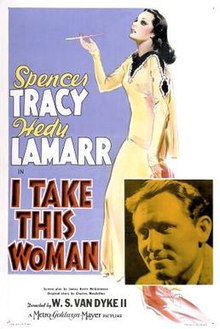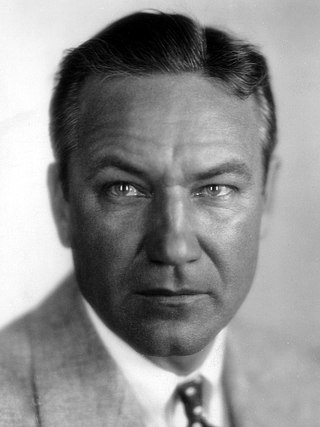
Victor Lonzo Fleming was an American film director, cinematographer, and producer. His most popular films were Gone with the Wind, for which he won an Academy Award for Best Director, and The Wizard of Oz. Fleming has those same two films listed in the top 10 of the American Film Institute's 2007 AFI's 100 Years...100 Movies list.

Hedy Lamarr was an Austro-Hungarian-born American actress and technology inventor. She was a film star during Hollywood's Golden Age.

Ecstasy is a 1933 Czech erotic romantic drama film directed by Gustav Machatý and starring Hedy Lamarr, Aribert Mog, and Zvonimir Rogoz. Machatý won the award for Best Director for this film at the 1934 Venice Film Festival.
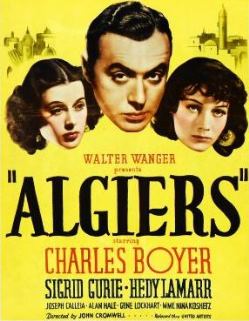
Algiers is a 1938 American drama film directed by John Cromwell and starring Charles Boyer, Sigrid Gurie, and Hedy Lamarr. Written by John Howard Lawson, the film is about a notorious French jewel thief hiding in the labyrinthine native quarter of Algiers known as the Casbah. Feeling imprisoned by his self-imposed exile, he is drawn out of hiding by a beautiful French tourist who reminds him of happier times in Paris. The Walter Wanger production was a remake of the successful 1937 French film Pépé le Moko, which derived its plot from the Henri La Barthe novel of the same name.

Tortilla Flat is a 1942 American romantic comedy film directed by Victor Fleming and starring Spencer Tracy, Hedy Lamarr, John Garfield, Frank Morgan, Akim Tamiroff, and Sheldon Leonard based on the 1935 novel of the same name by John Steinbeck. Frank Morgan received an Academy Award nomination for Best Supporting Actor for his poignant portrayal of The Pirate.
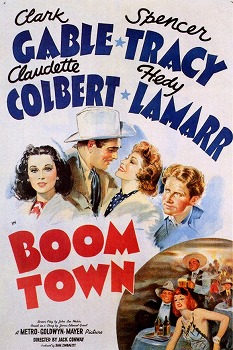
Boom Town is a 1940 American Western film starring Clark Gable, Spencer Tracy, Claudette Colbert, and Hedy Lamarr, and directed by Jack Conway. The supporting cast features Frank Morgan, Lionel Atwill, and Chill Wills. A story written by James Edward Grant in Cosmopolitan magazine entitled "A Lady Comes to Burkburnett" provided the inspiration for the film. The film was produced and released by Metro-Goldwyn-Mayer.

John Loder was established as a British film actor in Germany and Britain before migrating to the United States in 1928 for work in the new talkies. He worked in Hollywood for two periods, becoming an American citizen in 1947. After living also in Argentina, he became a naturalized British citizen in 1959.

H. M. Pulham, Esq. is a 1941 American drama film directed by King Vidor and starring Hedy Lamarr, Robert Young, and Ruth Hussey. Based on the novel H. M. Pulham, Esq. by John P. Marquand, the film is about a middle-aged businessman who has lived a conservative life according to the routine conventions of society, but who still remembers the beautiful young woman who once brought him out of his shell. Vidor co-wrote the screenplay with his wife, Elizabeth Hill Vidor. The film features an early uncredited appearance by Ava Gardner. In February 2020, the film was shown at the 70th Berlin International Film Festival, as part of a retrospective dedicated to King Vidor's career.
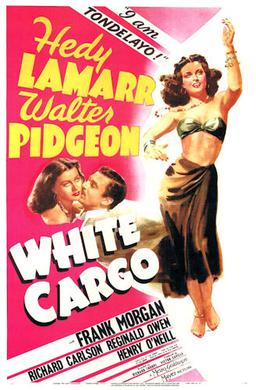
White Cargo is a 1942 American drama film starring Hedy Lamarr and Walter Pidgeon, and directed by Richard Thorpe. Released by Metro-Goldwyn-Mayer, it is based on the 1923 London and Broadway hit play by Leon Gordon, which was in turn adapted from the 1912 novel Hell's Playground by Ida Vera Simonton. The play had already been made into a British part-talkie, also titled White Cargo, with Maurice Evans in 1930. The 1942 film, unlike the play, begins in what was then the present-day, before unfolding in flashback.

My Favorite Spy is a 1951 American comedy spy film directed by Norman Z. McLeod and starring Bob Hope, Hedy Lamarr and Francis L. Sullivan. It was produced and distributed by Paramount Pictures and forms the third of a loose trilogy featuring Hope including My Favorite Blonde and My Favorite Brunette.
I Take This Woman may refer to:

I Take This Woman is a 1931 American pre-Code romance film directed by Marion Gering and starring Gary Cooper and Carole Lombard.

Dishonored Lady is a 1947 American film noir crime film directed by Robert Stevenson and starring Hedy Lamarr, Dennis O'Keefe and John Loder. It is based on the 1930 play Dishonored Lady by Edward Sheldon and Margaret Ayer Barnes. Lamarr and Loder were married when they made the film, but they divorced later in 1947.
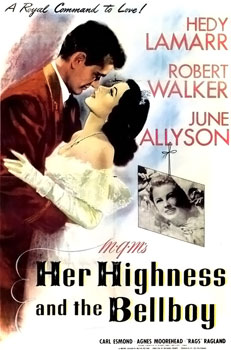
Her Highness and the Bellboy is a 1945 American romantic comedy film directed by Richard Thorpe and starring Hedy Lamarr, Robert Walker, and June Allyson. Written by Richard Connell and Gladys Lehman, the film is about a beautiful European princess who travels to New York City to find the newspaper columnist she fell in love with six years earlier. At her posh New York hotel, she is mistaken for a maid by a kind-hearted bellboy. Charmed by his confusion, the princess insists that he become her personal attendant, unaware that he has fallen in love with her. Her Highness and the Bellboy was released by Metro-Goldwyn-Mayer in the United States on July 11, 1945.

The Strange Woman is a 1946 American historical melodrama film directed by Edgar G. Ulmer and starring Hedy Lamarr, George Sanders and Louis Hayward. It is based on the 1941 novel of the same title by Ben Ames Williams. The screenplay was written by Ulmer and Hunt Stromberg, Originally released by United Artists, the film is now in the public domain.

Picture Mommy Dead is a 1966 American psychological horror film directed by Bert I. Gordon and starring Don Ameche, Martha Hyer, Susan Gordon, and Zsa Zsa Gabor. It follows a young girl who, after being released from a psychiatric hospital following her mother's death, begins to experience strange events in the family's mansion.

Let's Live a Little is a 1948 American romantic comedy film directed by Richard Wallace and starring Hedy Lamarr, Robert Cummings and Anna Sten. Written by Howard Irving Young, Edmund L. Hartmann, Albert J. Cohen, and Jack Harvey, the film is about an overworked advertising executive who is being pursued romantically by his former fiancée, a successful perfume magnate, who is also the ad agency's largest client. While visiting a new client—a psychiatrist and author—to discuss a proposed ad campaign, his life becomes further complicated when the new client turns out to be a beautiful woman, who decides to treat his nervous condition.

Storm in a Water Glass is a 1931 Austrian-German comedy film directed by Georg Jacoby and starring Hansi Niese, Renate Müller and Paul Otto. The film is based on the play of the same title by Bruno Frank, later adapted into the British film Storm in a Teacup. The film is known by the alternative title The Flower Woman of Lindenau. It is notable, in part, for the small role played by Hedy Lamarr in her second film. The film's art direction was by Hans Jacoby.

Lady of the Tropics is a 1939 American drama film directed by Jack Conway, starring Robert Taylor, Hedy Lamarr, and Joseph Schildkraut.

The Female Animal is a 1958 American CinemaScope drama film directed by Harry Keller and starring Hedy Lamarr, Jane Powell, Jan Sterling and George Nader.
